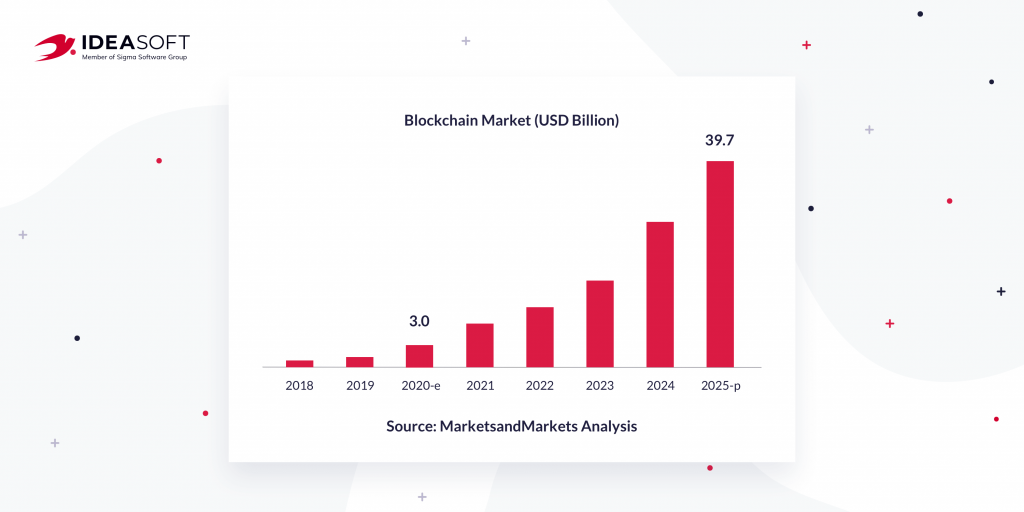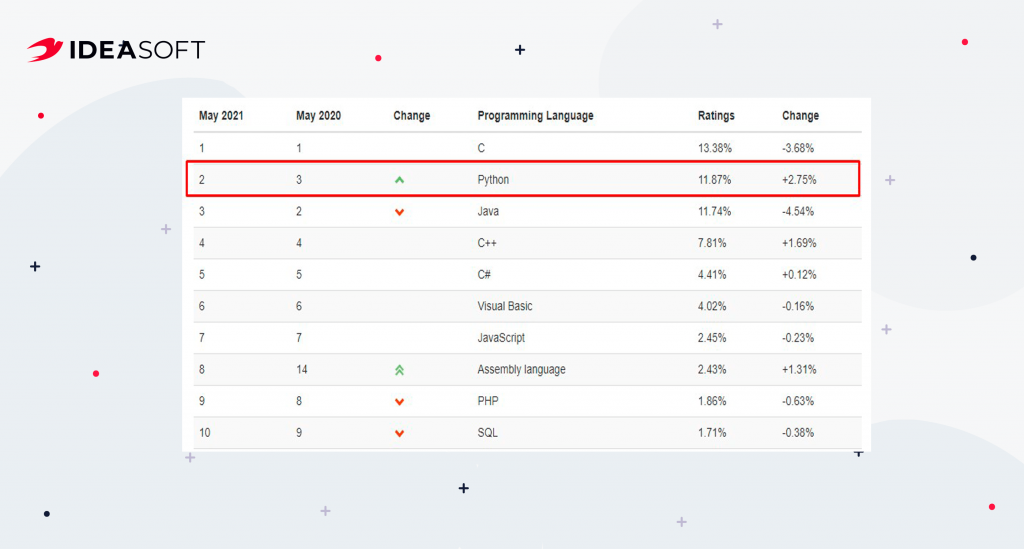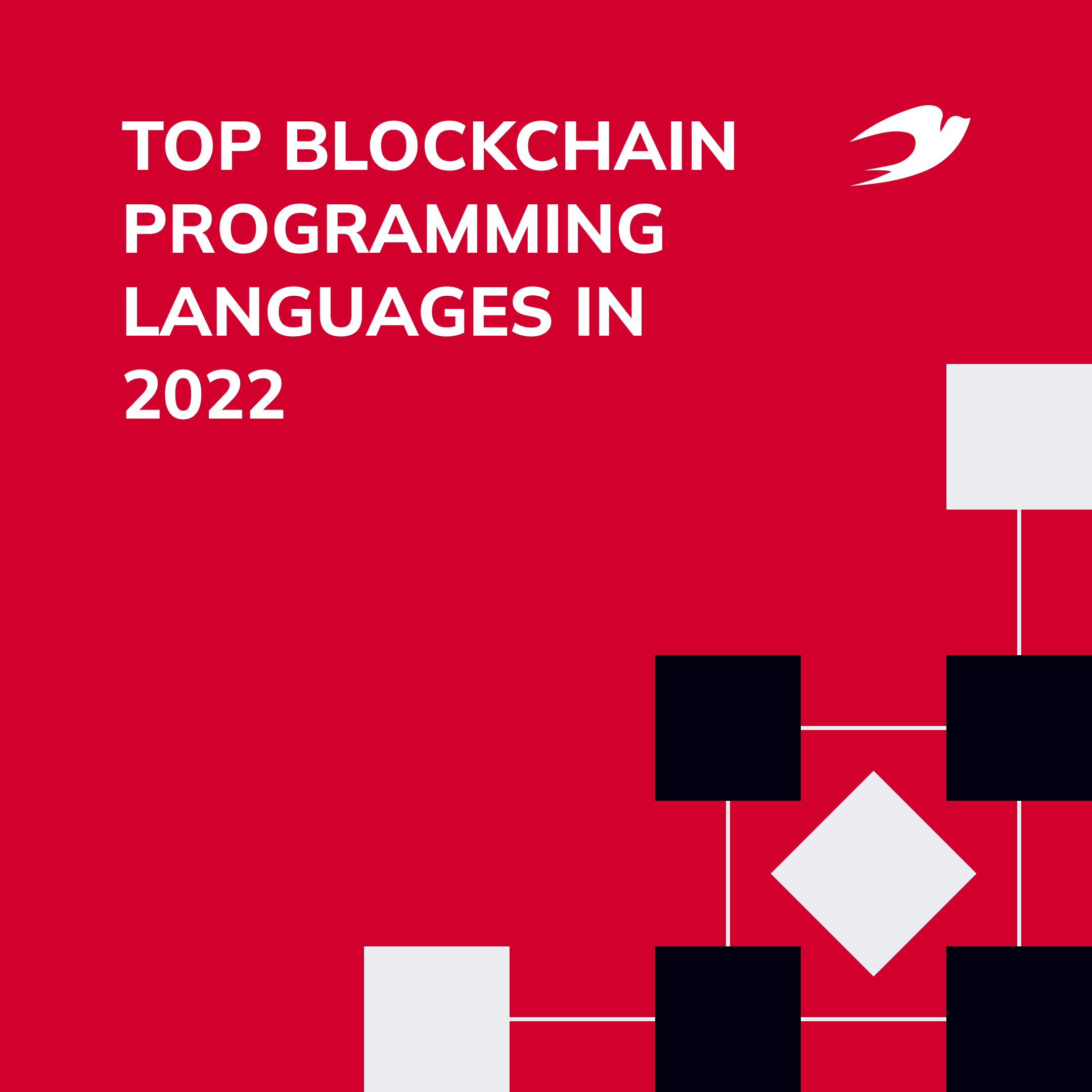The blockchain market is growing. Blockchain has become one of them because this technology has an enormous number of advantages, including security, transparency, lower support costs, and much more. So it’s not surprising that cutting-edge industries adopt blockchain. According to Statista, in 2020 banking was the industry with the largest blockchain spending, with a market share of almost 30%. And process manufacturing accounted for 11.4% of worldwide blockchain spending.
In this article, we’ll tell you about the top blockchain programming languages in 2025, what programming languages are used in popular blockchain projects and how to choose a programming language for your project.
Table of contents:
- Blockchain market overview
- Best programming languages for blockchain development
2.1 Solidity
2.2 GoLang
2.3 Python
2.4 C++
2.5 Java - Summing up
Blockchain market overview
Blockchain is more than just one of the latest technological advances. It is a disruptive technology with the potential to transform society and drive global growth. The application of blockchain goes far beyond a few corporate initiatives. Now it is used in areas such as medical research, environmental protection, logistics, etc. Blockchain technology is moving from experimentation to practical use in payments, smart contracts, record stores, and dApps.
According to MarketsandMarkets research, the global blockchain market size has grown from $3.0 billion in 2020 to $39.7 billion by 2025, at an impressive CAGR of 67.3% during 2020-2025. The increasing need for simplifying the business processes and the need for supply chain management applications will drive the overall blockchain market.

Deloitte global survey found that 83% of CEOs believe blockchain and investments in blockchain are worthwhile. According to the survey, 53% of respondents said blockchain technology has become a critical priority for their organizations. 2020 characterizes a significant increase in blockchain technology investments. Zebra Technologies Corporation named blockchain the technology trend that will influence CEOs’ and managers’ decisions in 2021.
The “Blockchain-as-a-service” (BaaS) model has enabled many technological innovations in cloud computing, IoT, and artificial intelligence (AI). Amazon, IBM, and Microsoft have already begun to develop tools and platforms that allow businesses to use blockchain technology as a service without the upfront investment in infrastructure and training. Cloud platforms will make blockchain technology available to many organizations.
So, what are the most popular programming languages used in blockchain development? You will find the answer below.
Best programming languages for blockchain development
Solidity
Solidity was developed by the creators of Ethereum. It is designed for deploying smart contracts and building decentralized applications (dApps). Solidity creators made it similar to JavaScript and the ECMA-262 specification so it is easily accessible to a wide range of developers. This is an extremely flexible language, as complex machine code is broken down into simple, human-understandable instructions. Solidity is another high-level programming language like JavaScript, C++, and Python. It is contract-oriented. This means smart contracts are responsible for storing all the logic that is used in the blockchain. All this made it one of the top blockchain programming languages.
If you want to build your smart contract on the Ethereum blockchain, Solidity is the most appropriate programming language for this purpose. Smart contracts that run on the Ethereum network are easily portable to other alternative blockchains. Although this programming language is relatively new, more than 200,000 developers are already working with it.
Examples of blockchain projects that use Solidity: Ethereum, Chainlink, Sushiswap, Compound Protocol.
GoLang
GoLang is a compiled multi-threaded programming language based on open source C and developed internally at Google. It is a single language that allows different processes to run simultaneously, which means simultaneous programming. Extremely fast, easy to maintain, and efficient, GoLang has all the advantages needed for distributed systems because it can handle multiple parts of the blockchain concurrently.
The language was developed for high-performance programs running on modern distributed systems and multicore processors. Market participants perceived the launch of GoLang as an attempt to create a replacement for C/C ++. Today, the Hyperledger Fabric blockchain platform uses this programming language. It is often used in NFT marketplace development. The GoLang developer community numbers about 800,000 people.
Examples of blockchain projects that use GoLang: GoChain, Dero, Loom Network, Ethereum, Hyperledger Fabric.
Python
Python is an object-oriented language thanks to which developers can prototype their ideas quickly with any long-winded coding required. It entered the top 5 most popular programming languages in 2022 according to the TIOBE and PYPL ratings. Python has huge open-source support which makes it ideal for blockchain development. It is sometimes used for crypto exchange development.

The ease of Python allows developers to quickly build and test out new ideas, and its open-source support brings with it a host of tools that help developers to solve a wide range of tasks. Python has a ton of frameworks and libraries that simplify the process of coding and reduce development time. That is why Python is one of the top blockchain programming languages.
Examples of blockchain projects that use Python: Hyperledger Fabric, Ethereum, NEO, Steemit.
C++
Although C++ is one of the oldest programming languages, it is still respected by developers all around the world. This object-oriented, rather than process-oriented, extension of the C language interacts perfectly with the internal structure of blockchain. The language had a significant impact on the development of the software industry.
C++ is one of the most used programming languages for building blockchain apps. Manipulating the blocks and chains of a blockchain with this language is as easy as building a toy castle out of LEGO bricks. C++ is also quite flexible – it provides full control over CPU and memory usage, coping perfectly with the large number of computational resources needed to serve all nodes quickly and simultaneously.
Originally C++ was used to code bitcoins, but today it is applied in implementing a wide range of innovative blockchain applications. Developers use C++ for writing most EOS smart contracts. It was used to write XRP Ledger, a decentralized cryptographic ledger that stores information about XRP.
Examples of blockchain projects that use C++: Blockchain, Monero, Ripple, EOS, Stellar, Litecoin.
Java
Java is a sought-out programming language for smart contracts. It is classic programming, and developers use it to create countless applications and games. Java is very common, so it is used in one way or another in almost all web systems, leaving programmers free to manage app logic and avoiding the need to focus on integration. It is not as resource-efficient as C+, but it is an ideal solution for handling multiple asynchronous operations at the same time. Nevertheless, Java offers developers the flexibility in writing code that can run on all machines without regard to architecture or platform. That’s why it’s also one of the top blockchain programming languages.

Java’s excellent code portability is the main reason why many blockchain companies use Java to develop their applications. Java has been used to create and deploy smart blockchain apps such as Truffle and ARK. Also, Java is a software environment for running Ethereum EVM scripts, it runs the underlying NEM blockchain network. There are currently more than 10 million Java developers worldwide, and more than 15 billion Java devices are running worldwide.
Examples of blockchain projects that use Java: NEM, IOTA, Ethereum, NEO, Hyperledger Fabric.
Summing up
Blockchain solutions solve problems of mistrust between all parties involved in the business, reduce unnecessary and irrelevant costs, promote transparency. Also, blockchain can provide great security. That’s because there’s a decentralized ledger where all the data is stored. It is resistant to cyber-attacks. For example, if you compare smart contracts with a traditional payment system, you will realize that blockchain is more secure.
There are many different programming languages for developing blockchain-based products, but there is no clear winner among them. It is difficult to say which programming language is the best for blockchain developers. Each of them is a great option for a specific purpose, or the choice depends on personal preference. Having a general idea about top blockchain programming languages, you can choose the one that fits your project the best.
First of all, you need to decide on a blockchain ecosystem, because each one supports a specific list of programming languages. Moreover, the choice depends on the type of project and the required scope of work, so it is best to consult with an experienced blockchain development team that can help you pick the right technology stack. For instance, if you are developing an AMM DEX, the choice of technology and language can significantly impact performance and security.
IdeaSoft will be happy to help you develop your project. Our experts will select the best technology that best suits your requirements. Feel free to share your ideas with the IdeaSoft team. Contact us for a free technical consultation.

